Development of Smart Systems for Biofilters: How Devices Purify Water Using Natural Materials
Water purification is a growing necessity in today’s world, as access to clean and safe drinking water becomes increasingly limited. One innovative approach to addressing this challenge is the development of "smart" biofilters. These systems, which integrate natural materials such as sand, activated carbon, and plant-based elements, are designed to mimic the natural processes found in ecosystems to purify water. In this article, we explore how modern technology is used to enhance these systems, enabling efficient and sustainable water filtration.

What Are Biofilters?
Biofilters are systems that utilize biological processes, often in combination with natural materials, to remove contaminants from water. They have been employed in various industries, from wastewater treatment to aquaculture, and are now being integrated into domestic water purification technologies.
The basic components of a biofilter usually include a combination of physical filtering materials—such as gravel, sand, and activated carbon—layered to trap and degrade impurities. These filters rely on both mechanical filtration and biological processes, where microorganisms living within the filter help break down organic pollutants.
The Role of Natural Materials in Water Filtration
Natural materials play a crucial role in biofiltration by physically trapping contaminants and providing a habitat for beneficial bacteria. For instance:
- Sand: Acts as a mechanical filter by capturing particles and sediment.
- Activated Carbon: Removes chemicals and impurities through adsorption, where contaminants adhere to the surface of the carbon.
- Gravel: Serves as a substrate for microorganisms and helps with the initial filtration of larger particles.
These materials are strategically layered in a biofilter to maximize water contact and filtration efficiency.
Smart Systems: Enhancing Traditional Biofilters
Smart systems for biofilters take traditional concepts and improve them with modern technology. These advancements make filtration processes more efficient, automated, and adaptable to different water sources and contamination levels. The key features of these smart systems include:
1. Sensors for Real-Time Monitoring
Smart biofilters are often equipped with sensors that continuously monitor the water quality at various stages of filtration. These sensors can detect parameters like turbidity, pH levels, and the presence of specific contaminants. The real-time data provided by these sensors allows the system to automatically adjust the filtration process as needed.
2. Automated Control Systems
With the integration of smart technology, biofilters can now include automated control systems that regulate water flow, adjust filtration layers, and maintain optimal conditions for microbial growth. These controls ensure that the filter operates at peak efficiency without requiring constant human intervention.
3. Energy Efficiency
Smart biofilter systems are designed to optimize energy consumption. Many traditional water purification systems rely on electrical pumps and external power sources, but smart biofilters use gravity-fed designs or low-energy pumps to reduce their environmental footprint. Some systems are even powered by renewable energy sources such as solar panels.
4. Self-Maintenance Features
One of the primary challenges of biofilters is the maintenance required to keep them functioning properly. Over time, the filtration layers can become clogged with debris, and the microbial populations may need to be replenished. Smart systems address this by incorporating self-cleaning mechanisms and alerts that notify users when maintenance is needed.
Natural and Technological Synergy
The combination of natural materials and smart technology in biofilters results in a powerful synergy that enhances water purification in an eco-friendly way. For instance, natural materials like sand and activated carbon provide the bulk of the filtration, while sensors and automated controls ensure that the system operates efficiently without requiring constant oversight.
In particular, the biological component of biofilters plays an essential role in breaking down organic matter. The beneficial microorganisms that reside within the filtration layers consume and metabolize pollutants, reducing the need for chemical additives. This biological process is regulated by the smart system to ensure that the bacteria remain healthy and active.
Applications of Smart Biofilters
Smart biofilters are highly versatile and can be used in a variety of settings, including:
- Residential Water Purification: In homes, smart biofilters provide an eco-friendly alternative to chemical-based purification systems. They can be used to treat drinking water, greywater, and even rainwater for reuse.
- Agriculture: In agricultural applications, biofilters can help remove contaminants from irrigation water, preventing the spread of harmful chemicals into crops and soil.
- Industrial Wastewater Treatment: Industries that produce large volumes of wastewater can implement smart biofilters to reduce their environmental impact by efficiently treating and recycling water.
- Aquaponics and Aquaculture: In closed-loop systems like aquaponics, smart biofilters are used to maintain clean water conditions for fish and plants, ensuring a healthy and sustainable ecosystem.
The Future of Smart Biofilters
As water scarcity continues to rise globally, the demand for innovative and sustainable water purification technologies will grow. Smart biofilters represent an important step in the evolution of water filtration, combining the power of natural materials with cutting-edge technology to create systems that are not only effective but also eco-friendly and scalable.
The integration of artificial intelligence (AI) and machine learning into these systems could take smart biofilters to the next level. AI could enable systems to learn from environmental changes and historical data to predict optimal filtration strategies for different water sources. This would result in even more efficient purification processes, reduced maintenance costs, and broader application possibilities.
Smart systems for biofilters demonstrate how combining traditional natural filtration methods with modern technology can lead to more efficient, sustainable, and adaptable water purification solutions. These systems use natural materials such as sand, gravel, and activated carbon, along with advanced sensors and automation, to create a solution that is both eco-friendly and effective across a wide range of applications. As we look to the future, smart biofilters are poised to play a crucial role in addressing global water purification challenges.
Articles
Subscribe to our updates and receive the most recent and interesting articles directly in your inbox.